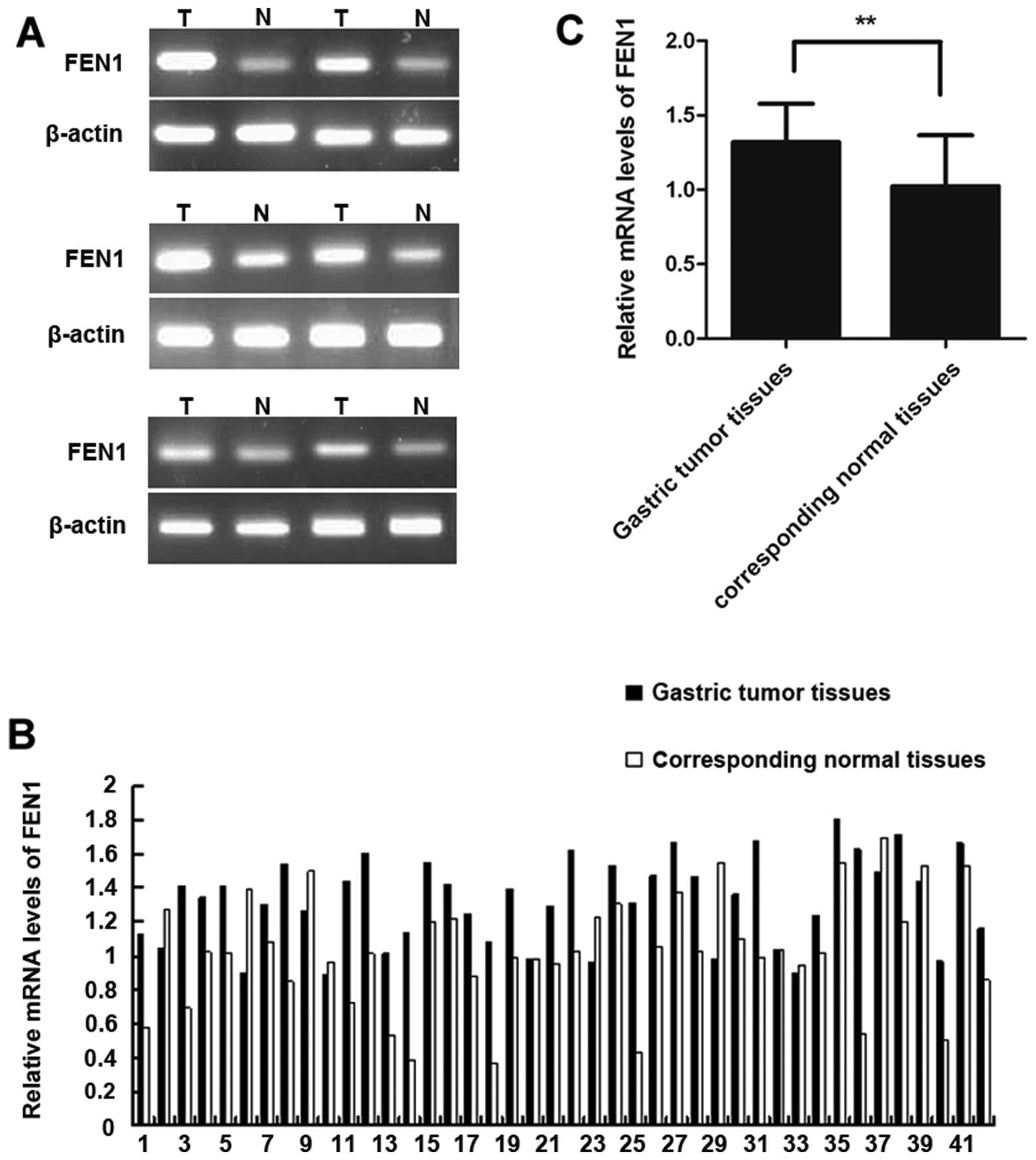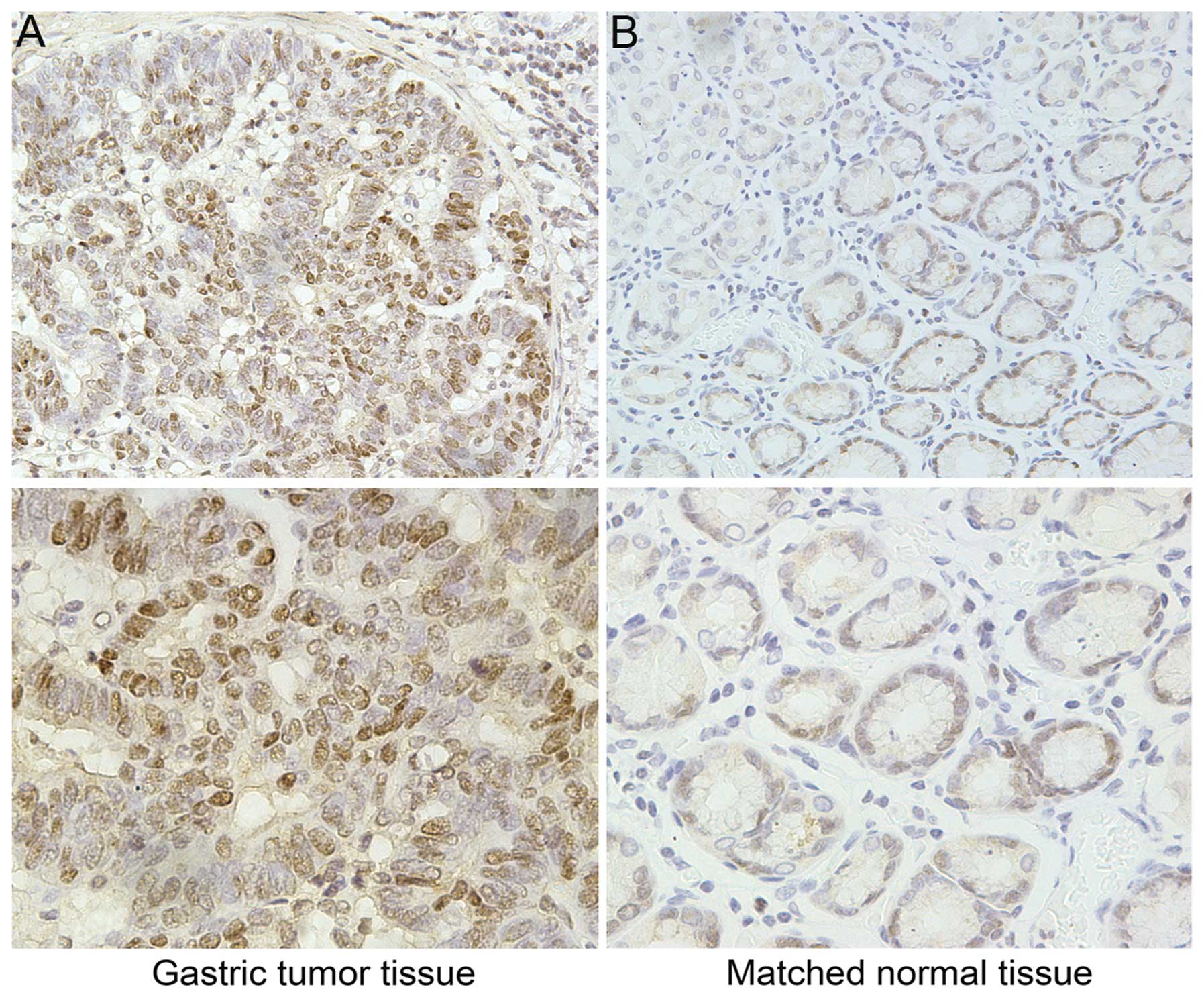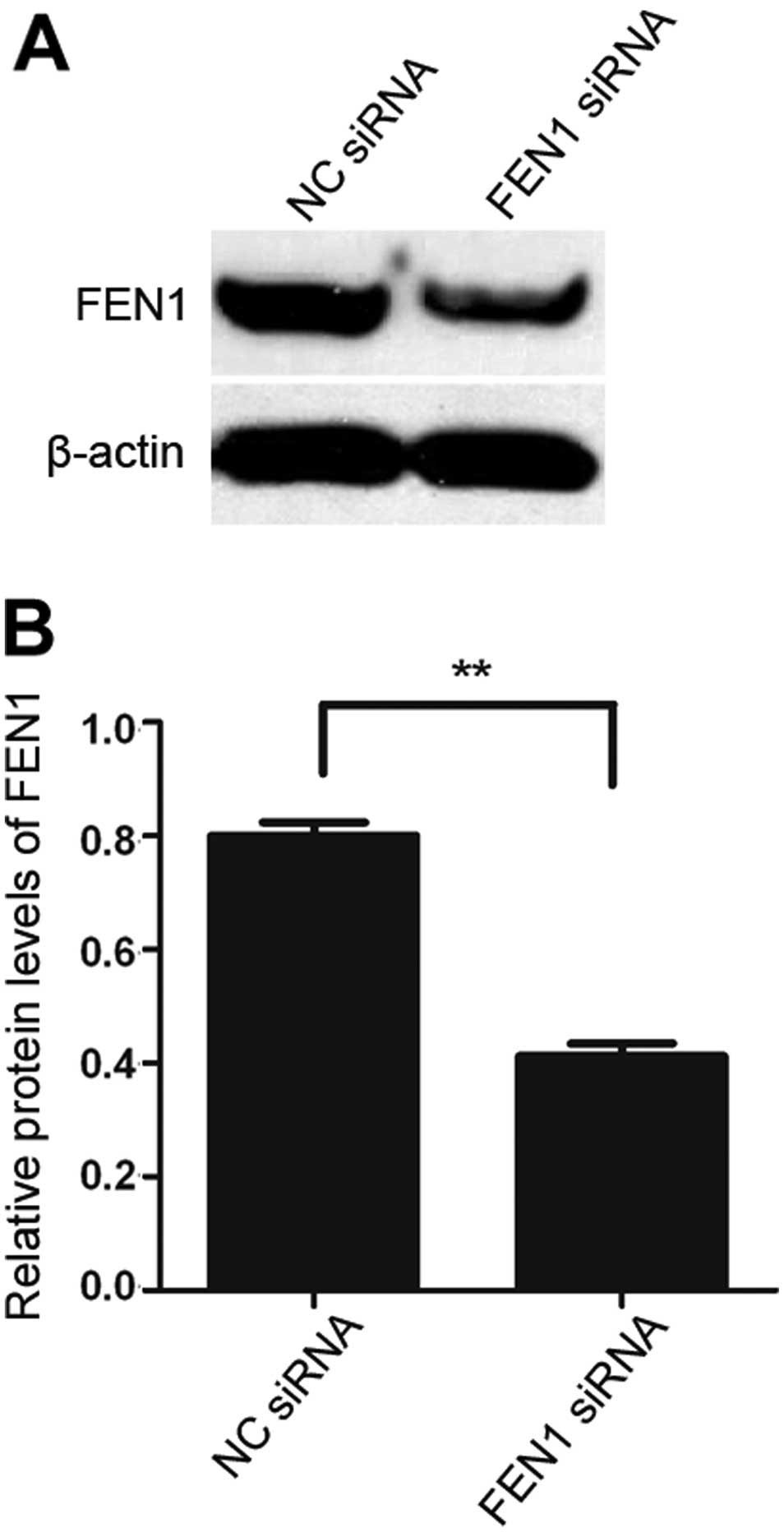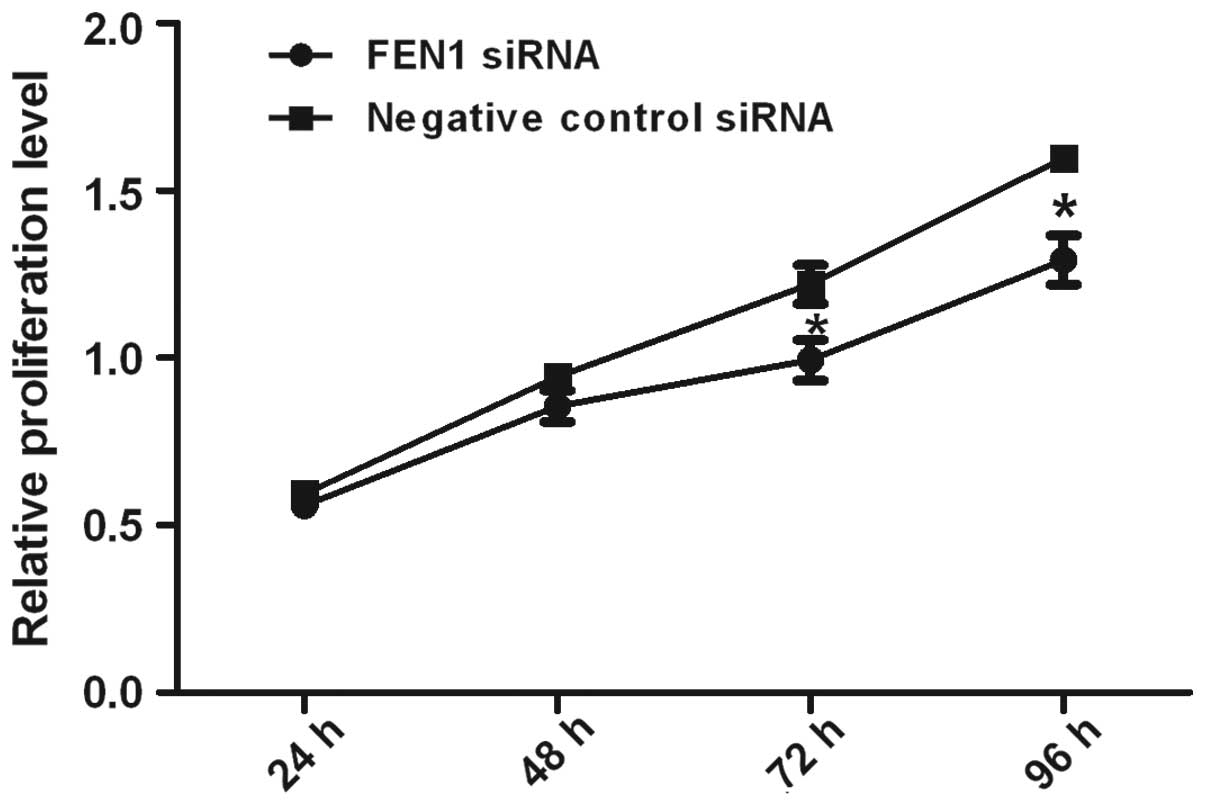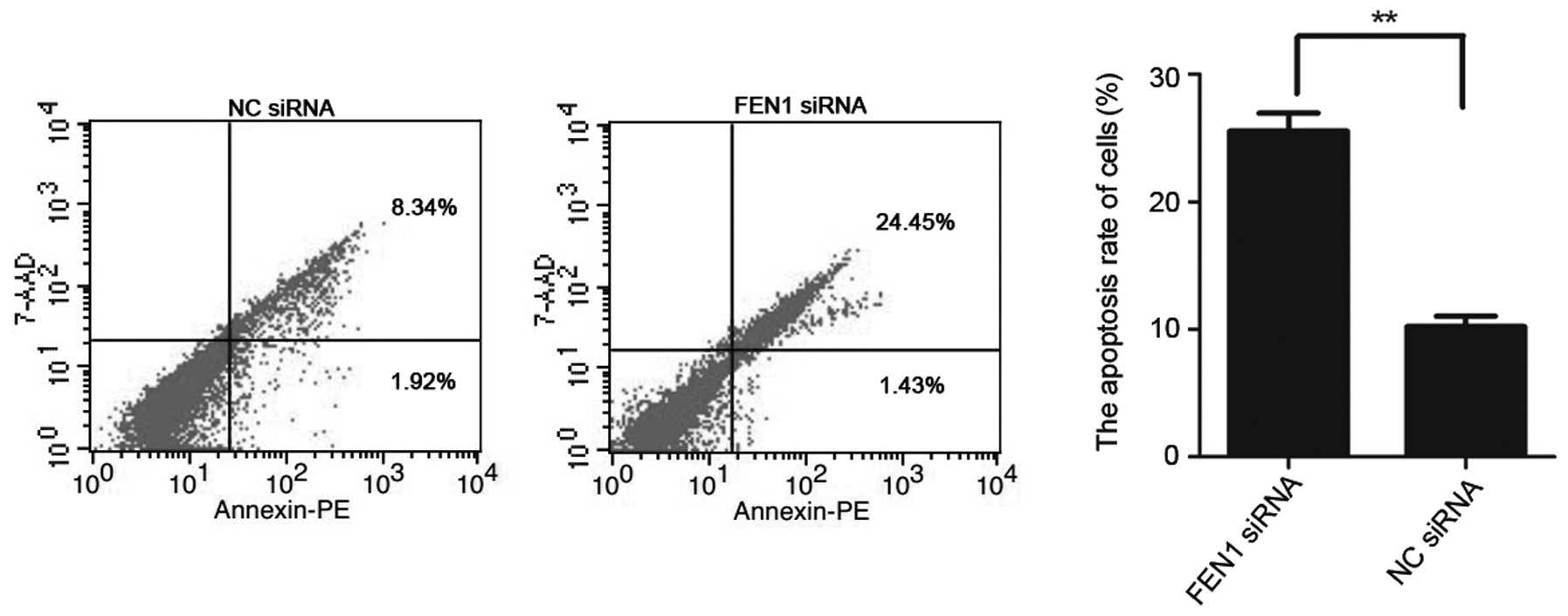|
1
|
Mitelman F: Catalogue of Chromosomes
Aberrations in Cancer. Cytogenet Cell Genet. 36:1–515.
1983.PubMed/NCBI
|
|
2
|
Hartgrink HH, Jansen EPM, van Grieken NCT
and van de Velde CJH: Gastric cancer-Authors’ reply. Lancet.
374:1594–1595. 2009.
|
|
3
|
Harrington JJ and Lieber MR: The
characterization of a mammalian DNA structure-specific
endonuclease. EMBO J. 13:1235–1246. 1994.PubMed/NCBI
|
|
4
|
Liu Y, Kao HI and Bambara RA: Flap
endonuclease 1: a central component of DNA metabolism. Ann Rev
Biochem. 73:589–615. 2004. View Article : Google Scholar : PubMed/NCBI
|
|
5
|
Frank G, Qiu J, Somsouk M, et al: Partial
functional deficiency of E160D flap endonuclease-1 mutant in vitro
and in vivo is due to defective cleavage of DNA substrates. J Biol
Chem. 273:33064–33072. 1998. View Article : Google Scholar : PubMed/NCBI
|
|
6
|
Shen B, Singh P, Liu R, et al: Multiple
but dissectible functions of FEN-1 nucleases in nucleic acid
processing, genome stability and diseases. Bioessays. 27:717–729.
2005. View Article : Google Scholar : PubMed/NCBI
|
|
7
|
Zheng L, Zhou M, Chai Q, et al: Novel
function of the flap endonuclease 1 complex in processing stalled
DNA replication forks. EMBO Rep. 6:83–89. 2005. View Article : Google Scholar : PubMed/NCBI
|
|
8
|
Tsutakawa SE, Classen S, Chapados BR, et
al: Human flap endonuclease structures, DNA double-base flipping,
and a unified understanding of the FEN1 superfamily. Cell.
145:198–211. 2011. View Article : Google Scholar : PubMed/NCBI
|
|
9
|
Henneke G, Friedrich-Heineken E and
Hübscher U: Flap endonuclease 1: a novel tumour suppressor protein.
Trends Biochem Sci. 28:384–390. 2003. View Article : Google Scholar : PubMed/NCBI
|
|
10
|
Saharia A, Teasley DC, Duxin JP, Dao B,
Chiappinelli KB and Stewart SA: FEN1 ensures telomere stability by
facilitating replication fork re-initiation. J Biol Chem.
285:27057–27066. 2010. View Article : Google Scholar : PubMed/NCBI
|
|
11
|
Saharia A, Guittat L, Crocker S, et al:
Flap endonuclease 1 contributes to telomere stability. Curr Biol.
18:496–500. 2008. View Article : Google Scholar : PubMed/NCBI
|
|
12
|
Sampathi S, Bhusari A, Shen B and Chai W:
Human flap endonuclease I is in complex with telomerase and is
required for telomerase-mediated telomere maintenance. J Biol Chem.
284:3682–3690. 2009. View Article : Google Scholar : PubMed/NCBI
|
|
13
|
Klungland A and Lindahl T: Second pathway
for completion of human DNA base excision-repair: reconstitution
with purified proteins and requirement for DNase IV (FEN1). EMBO J.
16:3341–3348. 1997. View Article : Google Scholar : PubMed/NCBI
|
|
14
|
Singh P, Zheng L, Chavez V, Qiu J and Shen
B: Concerted action of exonuclease and Gap-dependent endonuclease
activities of FEN-1 contributes to the resolution of triplet repeat
sequences (CTG)n- and (GAA)n-derived secondary structures formed
during maturation of Okazaki fragments. J Biol Chem. 282:3465–3477.
2007. View Article : Google Scholar
|
|
15
|
Kucherlapati M, Yang K, Kuraguchi M, et
al: Haploinsufficiency of Flap endonuclease (Fen1) leads to rapid
tumor progression. Proc Natl Acad Sci USA. 99:9924–9929. 2002.
View Article : Google Scholar : PubMed/NCBI
|
|
16
|
Zheng L, Dai H, Zhou M, et al: Fen1
mutations result in autoimmunity, chronic inflammation and cancers.
Nat Med. 13:812–819. 2007. View
Article : Google Scholar : PubMed/NCBI
|
|
17
|
Larsen E, Kleppa L, Meza TJ, et al:
Early-onset lymphoma and extensive embryonic apoptosis in two
domain-specific Fen1 mice mutants. Cancer Res. 68:4571–4579. 2008.
View Article : Google Scholar : PubMed/NCBI
|
|
18
|
Sato M, Girard L, Sekine I, et al:
Increased expression and no mutation of the Flap endonuclease
(FEN1) gene in human lung cancer. Oncogene. 22:7243–7246. 2003.
View Article : Google Scholar : PubMed/NCBI
|
|
19
|
LaTulippe E, Satagopan J, Smith A, et al:
Comprehensive gene expression analysis of prostate cancer reveals
distinct transcriptional programs associated with metastatic
disease. Cancer Res. 62:4499–4506. 2002.
|
|
20
|
Kim JM, Sohn HY, Yoon SY, et al:
Identification of gastric cancer-related genes using a cDNA
microarray containing novel expressed sequence tags expressed in
gastric cancer cells. Clin Cancer Res. 11:473–482. 2005.
|
|
21
|
Lam JS, Seligson DB, Yu H, et al: Flap
endonuclease 1 is overexpressed in prostate cancer and is
associated with a high Gleason score. BJU Int. 98:445–451. 2006.
View Article : Google Scholar : PubMed/NCBI
|
|
22
|
Krause A, Combaret V, Iacono I, et al:
Genome-wide analysis of gene expression in neuroblastomas detected
by mass screening. Cancer Lett. 225:111–120. 2005. View Article : Google Scholar : PubMed/NCBI
|
|
23
|
Iacobuzio-Donahue CA, Maitra A, Olsen M,
et al: Exploration of global gene expression patterns in pancreatic
adenocarcinoma using cDNA microarrays. Am J Pathol. 162:1151–1162.
2003. View Article : Google Scholar : PubMed/NCBI
|
|
24
|
Singh P, Yang M, Dai H, et al:
Overexpression and hypomethylation of flap endonuclease 1 gene in
breast and other cancers. Mol Cancer Res. 6:1710–1717. 2008.
|
|
25
|
Nikolova T, Christmann M and Kaina B: FEN1
is overexpressed in testis, lung and brain tumors. Anticancer Res.
29:2453–2459. 2009.PubMed/NCBI
|
|
26
|
Balakrishnan L and Bambara RA: Flap
Endonuclease 1. Ann Rev Biochem. 82:119–138. 2013. View Article : Google Scholar
|
|
27
|
Saharia A and Stewart S: FEN1 contributes
to telomere stability in ALT-positive tumor cells. Oncogene.
28:1162–1167. 2009. View Article : Google Scholar : PubMed/NCBI
|
|
28
|
Kim IS, Lee MY, Lee IH, Shin SL and Lee
SY: Gene expression of flap endonuclease-1 during cell
proliferation and differentiation. Biochim Biophys Acta.
1496:333–340. 2000. View Article : Google Scholar : PubMed/NCBI
|
|
29
|
Zheng L, Jia J, Finger LD, Guo Z, Zer C
and Shen B: Functional regulation of FEN1 nuclease and its link to
cancer. Nucleic Acids Res. 39:781–794. 2011. View Article : Google Scholar : PubMed/NCBI
|
|
30
|
Tumey LN, Huck B, Gleason E, et al: The
identification and optimization of 2,4-diketobutyric acids as flap
endonuclease 1 inhibitors. Bioorg Med Chem Lett. 14:4915–4918.
2004. View Article : Google Scholar : PubMed/NCBI
|
|
31
|
Tumey LN, Bom D, Huck B, et al: The
identification and optimization of a N-hydroxy urea series of flap
endonuclease 1 inhibitors. Bioorg Med Chem Lett. 15:277–281. 2005.
View Article : Google Scholar : PubMed/NCBI
|















